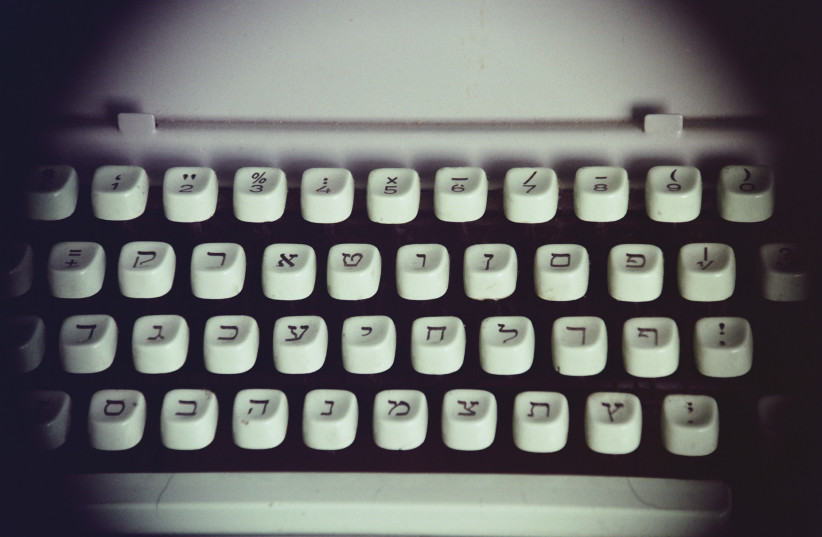Has this ever happened to you? You’re an American immigrant living in Israel and speaking Hebrew in a store or in a café with an Israeli stranger, and they say, “Boy, you have an accent.”
And I’ve been working on my Hebrew for 25 years. Which is the next terrible question they ask you. “How long have you been here?”
 Learn how to buy your home in Israel with confidence
Learn how to buy your home in Israel with confidenceI want to say 25 minutes, 25 hours, 25 days, not 25 years. I will not under any circumstances tell them 25 years. No way.
But I do.
“Really?” they say. “And you never learned the language.”

I did, I think to myself. I’m speaking it right now to you. But they don’t seem to notice.
For years I have tried to master this language. Let me hear you speak English, buddy, I should say to them. Let me hear how you sound.
Instead, I stay silent in my agony. But I want to throttle these people. Maybe because I was 31 when I began to learn the Hebrew alphabet, which is a monstrous collection of step stools facing front and back, upside down. Don’t even get me started on peh sofit or the difference between kuf and caf, and whether numbers are feminine or masculine or a million other things that don’t make any sense to me or to anyone else.
Oh, people have tried to help me. Once a native Israeli said, “I can teach you Hebrew verb grammar in a minute. It’s all made of binyamin.” Or something like that. She showed me eight or nine different forms of verbs which I could not absorb. No klita [absorption], baby.
If I had gone to Hebrew school, or Sunday school or day school, if I’d had some kind of reckoning with the Hebrew language before the age of 30, my accent and my binyamin might be more refined.
But I didn’t. No sir. I moved to this country without being able to read a letter or a word. Analfabeto.
And you know what. I learned. Ulpan, the ultimate humiliation. “Are you dyslectic?” asked my teacher, even though I had taught college in America. College. And here I was in kita alef, back in first grade. I even started getting headaches and not wanting to go to school, where I faced torment from the teacher and the students who somehow knew how to write and speak already.
Kita alef, kita beit, kita gimmel. Trying and trying to be able to communicate. And I think I can now. At least make sentences if not full paragraphs, one-on-one with a person who understands that it’s okay to have an American accent. And you might not believe this, but I’ve spoken to groups in Hebrew, despite my level of imperfection. Quite the humbling experience.
IF ONLY I had a French accent, then I would sound marvelous and perfectly attired, or an Italian one so I could sound sexy, or even a Russian one so that I could sound surly?
But no, I have to have a dumb American accent that labels me forevermore as an American. Because even before I open my mouth, people often know I’m American and speak to me in English. It’s like I have one of those cartoon bubbles over my head announcing: American, American everywhere I go. I don’t mind being American. I just hate sounding like one.
I know it’s not just me. I have friends like me, Americans who never had to master another language, to pave another path for language in the brain as children. I wish I had that complex circuitry blazed in my neurons.
But I, like many of my fellow American immigrants, don’t and we never will. And still we try to communicate, to master the language. One small step (stool) at a time. So I make stupid mistakes, like confusing a potato and an orange. Or a shout for a laugh. Or even worse.
Ben-Yehuda, what can I say? I do admire you. It’s not every day that a person revives a language. Especially one that reads backward. I won’t give up. No siree Bob. I’m here to stay. Once I even dreamed in Hebrew. It hasn’t happened again.
With my luck, in my next Hebrew dream, I’ll hear a woman speaking Hebrew with a terrible American accent, and I’ll say to her: “You know, you really have an accent!” And it will be me speaking in the terrible accent.
But I will never give up, no matter how rotten I sound. Rotten. Rakum. No, no, no, that’s not it. I mean rakuv, rakuv, rakuv.
The writer is the cofounder of the Koby Mandell Foundation and the author of The Blessing of a Broken Heart. Her most recent book is Reaching for Comfort.
 Sign up for our newsletter to learn more
Sign up for our newsletter to learn more 